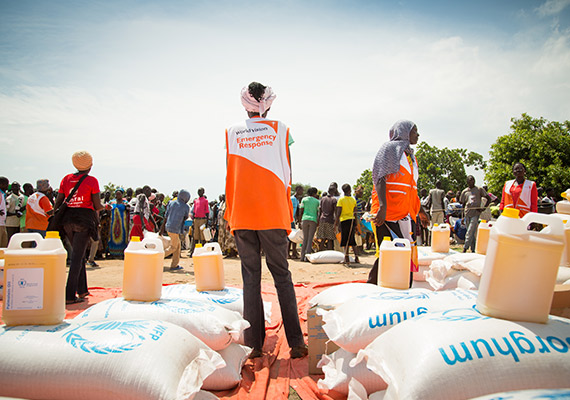
May 11, 2021 – World Vision Australia (WVA) welcomes Australia's aid boost to the Indo-Pacific region, but argues the Government has missed an opportunity by not playing a role in helping prevent the biggest hunger crisis in recent memory.
WVA Chief Executive Officer Daniel Wordsworth says the Government's extra funding of more than $300 million in the Pacific and Timor Leste was the right response at the right time, to help our neighbours meet the challenge of COVID-19.
"Clearly, the COVID-19 pandemic represents the most profound challenge the world has faced in generations," Mr Wordsworth says.
The Government's temporary and targeted extra funding of around $335 million (in 2021) and over $1 billion over the forward years of the Budget towards the response and recovery "is absolutely the right thing to do - it's the humane thing to do", Mr Wordsworth says.
"As the recent outbreaks in India and Papua New Guinea have shown us, our region is not immune to the devastating impacts of COVID and this battle is far from won. So it's pleasing to see Australia play its part as a neighbour and friend to help in this hour of critical need.
"Throughout the pandemic, World Vision has been greatly buoyed by the care and generosity of Australians for other more vulnerable nations – it is good to see this reflected in the Government's response, too."
But Mr Wordsworth warns that the aftershocks of the pandemic have the potential to wreak havoc farther afield, especially on children, with large swathes of Africa and the Middle East suffering unprecedented levels of acute food insecurity. In 2020, 133,000 people already experienced famine-like conditions in Burkina Faso, South Sudan and Yemen, and this situation will only worsen unless urgent humanitarian action is taken.
"We are looking down the barrel of a devastating hunger crisis across several countries in Africa and the Middle East, with around 34 million people – half of whom are children – just one step away from famine," he says. "Without urgent action, we are talking about potentially tens of thousands of people dying within just a few months.
"We, therefore, see this Budget as a lost opportunity for Australia to show leadership and be part of a global solution to prevent this looming humanitarian crisis. We would like to see the Government join G7 governments, like the United States and United Kingdom, which last week committed to act via a Famine Prevention and Humanitarian Crises Compact."
The $38 million funding for the World Food Programme is still $2 million short of where it was in 2019. But Mr Wordsworth says it isn't too late for the Australian Government to join World Vision in the fight against these COVID-induced hunger crises.
"Development is most effective when delivered in partnership, and we have seen a pivot of our aid program to effective, targeted delivery of strong outcomes.
"We would like to see the Government join us in this next battle against the aftershocks of COVID-19. We again call on the Government to urgently adopt a $150 million famine prevention package to prevent famine before it is too late. Because we know from past experience, that once famine is officially declared, it is already too late."
The $150 million would be temporary and targeted money on top of planned 2020-21 aid expenditure and be used to deliver emergency food assistance to people at risk of famine, scale up treatment and prevention of child malnutrition and build long-term community resilience to hunger.
WVA also welcomes the Government's dual focus in the aid budget in responding to both the urgent and long-term impacts of the pandemic, but urges that these investments be inclusive and targeted at the most vulnerable.
"We know that the pandemic only increases inequalities, particularly for the ultra-poor, women and the young, so these groups need to be prioritised in any Government investment in economic and longer-term recoveries in the region.
"That is why we welcome the Government's investment of $18 million over four years to strengthen social protection for vulnerable households in the Pacific at this difficult time.
"We cannot lose sight of the long-term implications of the pandemic, which are hitting the most vulnerable communities hardest – rising poverty, ravaged livelihoods, acute hunger and increasing risks to children's safety, which could permanently scar a generation."






